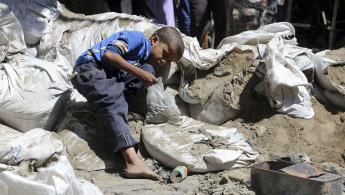Children among civilians killed in Saudi-led coalition strike on Yemen's Taiz
Nine civilians were killed in overnight airstrikes east of Yemen's third city of Taiz, a medic and rebel forces said on Saturday.
Two children were among the nine killed in airstrikes by a Saudi-led military coalition fighting on the side of the government, a doctor at al-Thawra hospital told AFP.
The doctor, who requested anonymity, said a number of other people were wounded.
The Houthi rebels said the coalition targeted a petrol station in Taiz province, according to the rebel-run Saba news agency.
The city of Taiz is under siege by the Houthi rebels but controlled by pro-government forces, who are supported by the military coalition led by Saudi Arabia and the United Arab Emirates.
Yemen's four-year conflict has triggered what the UN terms the world's worst humanitarian crisis, with over 24 million people, more than two-thirds of the population, in need of aid.
The fighting in the Arab world's poorest country has killed an estimated 60,000 people and left millions suffering from lack of food and medical care.
Yemen's internationally recognised president sent a letter to the UN chief, criticising his envoy to the war-torn Arab country over allegedly siding with Iran-aligned Houthi rebels, the president's office said Friday.
In the letter addressed to Antonio Guterres, Yemeni President Abed Rabbo Mansour Hadi accuses Martin Griffiths, the UN special envoy to Yemen, of undermining chances for peace. Hadi also warns his government would stop dealing with the UN envoy.
Read more: Yemen at crossroads despite rebel pullback, says UN envoy
"I can no longer tolerate the violations committed by the special envoy, which threaten prospects for a solution," read the five-page letter, a copy of which was released to reporters Thursday.
It also accuses Griffiths of treating the "rebels as a de-facto government and as an equal to the legitimate and elected government" of Yemen.
Tensions arose between Griffiths and Hadi last week after the UN announced the long-delayed Houthi withdrawal from the flashpoint port city of Hodeida.
Hadi's government accused Griffiths at the time of turning a blind eye that the rebels had allegedly only handed control of the port to "militia leaders" loyal to them. The "redeployment of Houthis" from Hodeida was part of a UN-brokered deal concluded in December.
Hadi went on to say that Griffiths's "poor understanding" of the Yemeni conflict makes him unfit for his post.
While briefing the UN Security Council on the situation in Yemen last week, Griffiths urged the warring sides to maintain the momentum of the Houthi withdrawal from Hodeida — the country's lifeline to foreign aid — and to work urgently on a political solution to the devastating conflict.
There were "signs of hope" but "also alarming signs" that could threaten progress, Griffiths said, a reference to continuing clashes in the southern Dhale province.
Later Friday, Houthi rebel leader Mohamed Ali al-Houthi tweeted that Hadi's letter to the UN chief was a "miserable attempt to curtail peace."
Follow us on Twitter: @The_NewArab




 Follow the Middle East's top stories in English at The New Arab on Google News
Follow the Middle East's top stories in English at The New Arab on Google News
![A group of Palestinians, foreign and Israeli activists gather to participated in an olive picking event on the land in the town of Battir, which is under threat of confiscation by Israel in Bethlehem, occupied West Bank on 8 November 2024. [Getty]](/sites/default/files/styles/image_330x185/public/2182930803.jpeg?h=199d8c1f&itok=__0LgGsa)

![People gathered around the rubble of destroyed houses to search for survivors [Getty]](/sites/default/files/styles/image_330x185/public/2024-11/GettyImages-2184733820.jpg?h=199d8c1f&itok=NiM1LO2f)